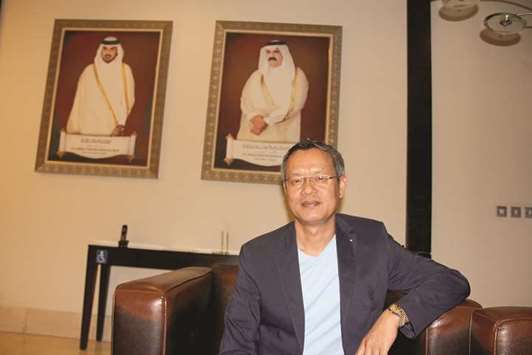Rohan Gurung, President of Nepali Association of Foreign Employment Agencies (NAFEA), was recently in Doha to gather information about the Nepali expatriates working in Qatar. He came to Doha after visiting neighbouring Gulf countries.
The purpose of his long trip was to visit Nepali embassies in different countries and learn about experiences of the workers. In Doha, Gurung met Mani Ratna Sharma, Chargé d’affaires at the Nepali embassy; and Shiva Ram Paudel, Labour Counsellor. He inquired about the conditions of the workers during the ongoing blockade.
Talking to Community, he shared details about his visit. Gurung said he came to learn about the condition of the workers during the blockade. “During my field visit, I witnessed no negative impact of the blockade on the Nepali workers,” Gurung said. He also visited some of the stadiums built for FIFA World Cup 2022. It was Gurung’s second visit to Qatar. He earlier visited the country seven years ago.
According to the data released by NAFEA, there are around half a million Nepali people in Qatar. Likewise, there are 60,000 in Kuwait, 30,000 in Oman, and 400, 000 combined in Malaysia and in another Gulf country.
As of now, Qatar remains the top choice among the Nepali youths opting for overseas jobs. In Nepal, laws are now stricter, restricting the manpower agencies to exploit the aspring workers.
Gurung said that NAFEA was working to make the Gulf tegion a safe destination for the Nepali workers. “We have recently blacklisted 86 companies based in Gulf region. But, there is not a single blacklisted company from Qatar,” he said.
Gurung said that the projects like FIFA World Cup 2022 and Qatar National Vision 2030 had been attracting the workers. The Nepali people come to Qatar through 756 registered manpower agencies. Qatar has a labour agreement with Nepal. NAFEA charges $15 from a worker as insurance money before he or she departs from Nepal. In case of a death, the heirs of the deceased get $7,000.
Gurung said NAFEA had been been very strict against the companies which would make false promises and agreements with the workers. Regarding the fee some agencies are charging despite the scheme of ‘free visa and free ticket’, citing administrative costs, Gurung said, “We are looking forward to having the best international practices.”
Nepal issues individual work permits for 165 countries and institutional work permits for 108 countries. But, almost all recruiting agencies send the workers to Middle East and South East Asia. There is less interest among the agencies to send the workers to Europe.
“Regarding the blockade, I think it has affected the whole of Gulf region,” he said, “All Gulf countries should solve the issues through dialogue,” he added.
“The demand of labour in Qatar is high. So we should make labour export more disciplined,” he noted.

VISITOR: Rohan Gurung
